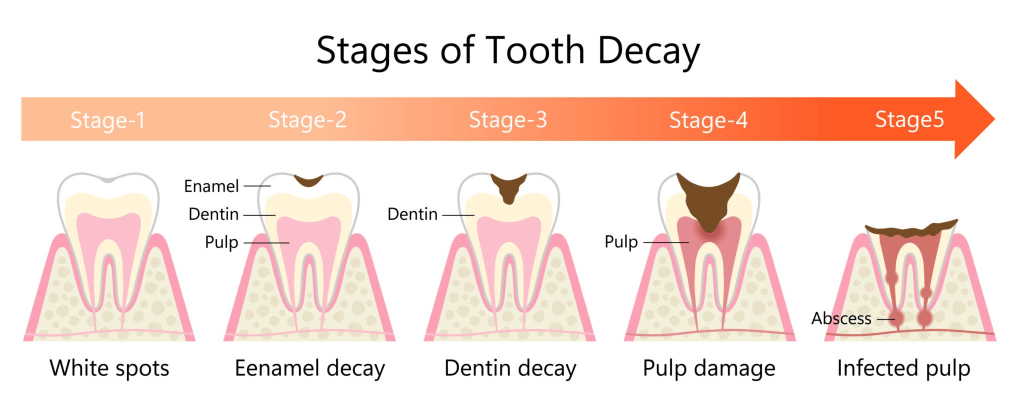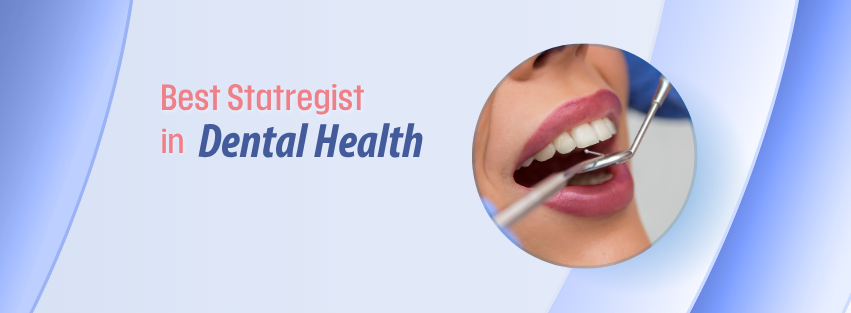
Understanding How to Break Down Tooth Decay: Causes and Symptoms
Tooth decay can affect anyone, young or old. Understanding how to break down the factors of tooth decay is essential for maintaining good oral health. It’s crucial to recognize its causes and symptoms to take action early. Being aware of what contributes to tooth decay can help you protect your smile.
What Causes Tooth Decay?
Tooth decay occurs when the enamel, which is the hard outer layer of your teeth, becomes damaged. This can lead to cavities or holes in the teeth, which can worsen over time. Here are some common causes:
- Poor Oral Hygiene: Failing to brush and floss regularly allows plaque to build up. Plaque is a sticky film of bacteria that produces acids, eating away at tooth enamel.
- Diet High in Sugars and Carbohydrates: Foods and drinks high in sugars and starches feed the bacteria in your mouth, leading to more acid production.
- Dry Mouth: Saliva helps wash away food particles and neutralize acid. A lack of saliva, often due to certain medications or health conditions, can increase decay risk.
- Acidic Beverages: Sodas and some fruit juices can erode enamel due to their acidity. Frequent consumption can accelerate tooth decay.
- Dental Health Neglect: Skipping regular dental check-ups can allow small problems to become bigger issues, increasing the risk of decay.
What are the symptoms of tooth decay?
Being aware of the symptoms can lead you to seek help before the decay progresses. Common symptoms include:
- Tooth Sensitivity: You might feel pain or discomfort while eating hot, cold, or sweet foods.
- Toothache: Persistent pain in the tooth can be a clear sign of decay.
- Visible Holes or Pits: Look for dark spots or holes on the surface of your teeth.
- Bad Breath: Foul-smelling breath can indicate the presence of decay-driven bacteria.
- Swelling or Redness: Gums may become swollen or tender around the decayed tooth.
Recognizing these symptoms early can lead to prompt treatment, preventing more extensive and costly procedures in the future. If you notice any of these signs, it’s important to visit your dentist as soon as possible.
How to prevent tooth decay?
Prevention is always better than cure. Here are practical steps you can take to break down the chances of tooth decay:
- Brush Your Teeth Twice a Day: Use fluoride toothpaste and brush thoroughly for two minutes each time. Don’t forget to brush your tongue!
- Floss Daily: Flossing removes food particles and plaque between teeth where your toothbrush can’t reach.
- Limit Sugary Foods: Cut back on candies, sodas, and other sugary snacks. If you eat sweets, do so during meals rather than as snacks.
- Drink Plenty of Water: Drinking water can help rinse away food particles and bacteria. It’s especially important if you consume acidic drinks.
- Regular Dental Check-ups: Schedule dental visits every six months for professional cleanings and check-ups. Your dentist can catch early signs of decay.
- Consider Dental Sealants: Sealants can provide an added layer of protection on chewing surfaces, especially for children.
Taking proactive steps to maintain your oral health can significantly decrease your chances of developing tooth decay. By understanding its causes and symptoms, you are equipped to safeguard your smile effectively.
Effective prevention techniques for tooth decay:
Tooth decay is a common problem that can affect anyone but can be effectively prevented with proactive measures. Understanding how to care for your teeth can set you on the path to a healthier smile. The following techniques can help you maintain good dental health and ward off decay.
Establish a consistent oral hygiene routine:
Brushing your teeth at least twice a day is the cornerstone of preventing tooth decay. Here’s how to do it right:
- Choose the right toothbrush: Use a soft-bristled brush with a small head for better reach.
- Use fluoride toothpaste: Fluoride strengthens tooth enamel and helps remineralize areas that may be starting to decay.
- Brush for two minutes: Make sure to reach all surfaces of your teeth – inner, outer, and chewing surfaces.
- Don’t forget to floss: Flossing daily removes food particles and plaque from between your teeth that brushing alone may miss.
Limit sugar intake:
Diet plays a crucial role in dental health. Cutting down on sugary foods and drinks can significantly reduce your risk of cavities. Consider these tips:
- Avoid sugary snacks: Instead, snack on fruits, vegetables, or nuts that are less likely to promote decay.
- Drink water instead of soda: Water helps wash away food particles and keeps your mouth moist, reducing cavity-causing bacteria.
- Choose sugar-free options: If you enjoy sweets, opt for sugar-free versions or dark chocolate, which is less harmful to teeth.
Regular dental check-ups:
Visiting the dentist regularly is vital for maintaining oral health.
- Schedule biannual check-ups: These appointments allow your dentist to catch potential issues before they escalate.
- Professional cleanings: Dental hygienists can remove hardened plaque, known as tartar, that regular brushing cannot.
- Discuss sealants: Dental sealants are protective coatings applied to the chewing surfaces of your back teeth, where decay is most common.
Consider fluoride treatments:
Fluoride is a powerful tool in the fight against tooth decay. Here’s how fluoride treatments can benefit you:
- Strengthen enamel: Fluoride helps rebuild weakened tooth enamel and can reverse early signs of decay.
- Professional applications: Your dentist may recommend professional fluoride treatments if you are at a higher risk of decay.
- Fluoride rinses: Over-the-counter fluoride mouth rinses are also available to boost your daily oral care routine.
Maintain a balanced diet:
Your overall nutrition affects your dental health. Aim to eat a balanced diet rich in:
- Calcium: Cheese, yogurt, and leafy greens strengthen teeth and bones.
- Phosphorus: Foods like meat, fish, and eggs help rebuild tooth enamel.
- Vitamins: Vitamin C is crucial for gum health, while Vitamin D aids in calcium absorption.
Limit acidic foods and drinks:
Acidic beverages and foods can erode enamel, leading to tooth decay. Consider these strategies:
- Drink through a straw: Using a straw can help minimize contact between acidic drinks and your teeth.
- Rinse your mouth: After consuming acidic foods or drinks, rinse your mouth with water to neutralize acids.
- Wait before brushing: After eating acidic foods, wait at least 30 minutes to brush your teeth. Brushing right away can wear down softened enamel.
By following these effective prevention techniques, you can reduce your chances of developing tooth decay significantly. A commitment to good dental hygiene, mindful eating choices, and regular check-ups can lead to a healthier smile. Take these steps seriously, and your teeth will thank you for it!
Nutritional choices that impact dental health:
Your smile is one of your most valuable assets, and taking care of your dental health is essential for a beautiful and healthy grin. One fundamental way to maintain strong teeth and gums is through nutritional choices. The foods you eat can significantly impact your dental health, either enhancing it or causing serious damage. Let’s explore how what you put on your plate can make a difference.
Understanding tooth-friendly foods:

The key to fostering good dental health lies in choosing nutrient-rich foods that help strengthen teeth and gums. Here are some food groups that contribute positively to your oral health:
- Dairy Products: Foods like milk, cheese, and yogurt are rich in calcium and phosphorus, essential for bone development. Calcium strengthens teeth and bones, while phosphorus helps with the remineralization process of your enamel.
- Fruits and Vegetables: Crunchy fruits and veggies, such as apples and carrots, help stimulate your gums and increase saliva production. Saliva is your mouth’s natural defense against cavities as it neutralizes acids and washes away food particles.
- Nuts and Seeds: Almonds, walnuts, and sesame seeds are low in sugar and high in healthy fats, providing nutrients without the harmful sugars found in many snacks. They also help with gum health.
- Whole Grains: Foods like oatmeal, whole grain bread, and brown rice provide fiber and are often lower in sugar compared to their refined counterparts, making them a better choice for your dental health.
Foods to limit for better dental health:
While many foods can promote oral health, several can enhance the risk of tooth decay and gum disease. Being mindful of what you eat is just as crucial as choosing the right foods. Here are some categories of foods to limit:
- Sugary Snacks and Drinks: Candy, soda, and sweet drinks are major culprits for tooth decay. They provide bacteria in your mouth with the sugar they thrive on, leading to the production of harmful acids that attack tooth enamel.
- Starchy Foods: Chips, bread, and pasta can stick to your teeth and provide an ideal environment for cavity-causing bacteria if not cleaned properly.
- Acidic Foods and Drinks: Citrus fruits and sodas can erode enamel over time due to their high acidity. It’s good to consume them in moderation and wash your mouth with water afterward.
Importance of hydration:
Staying hydrated plays a crucial role in maintaining dental health. Water not only helps to wash away food particles but also keeps your mouth moist, aiding in saliva production. Saliva is significant for neutralizing acids produced by bacteria, which is vital to prevent decay and gum disease. Aim to drink plenty of water throughout the day and opt for fluoridated water when possible to fortify your enamel.
Dental-Friendly snacking:
If you’re looking for snack options that are easy on your teeth, consider the following:
- Cheese Cubes: Cheese contains casein, a protein that helps strengthen enamel.
- Fresh Fruits: Berries, especially strawberries, have natural compounds that may help whiten your teeth.
- Vegetable Sticks: Crunchy vegetables can clear plaque and food debris.
Building a balanced diet:
To achieve optimal dental health, it’s vital to build a balanced diet that incorporates a variety of food groups. Aim to include:
- Protein: Eggs, lean meats, and fish provide necessary vitamins and minerals.
- Healthy Fats: Avocados, olive oil, and fatty fish support overall well-being.
- B Vitamins: Found in whole grains, legumes, and vegetables, they support gum health.
Your dietary choices significantly influence your dental health. By focusing on nutrient-dense foods, limiting harmful snacks, and keeping hydrated, you can create a strong foundation for your teeth and gums. Remember, healthy habits not only enhance your smile but contribute to your overall health, building confidence and well-being.
Oral hygiene improvement:
Improving your daily oral hygiene routine is a vital step in preventing the progression of tooth decay. Here are some tips:
- Brush your teeth at least twice a day with fluoride toothpaste.
- Floss daily to remove plaque and food particles from between your teeth.
- Use an antibacterial mouthwash to reduce bacteria in your mouth.
- Limit sugary snacks and beverages that contribute to decay.
By following these practices, you can help maintain your oral health and reduce the likelihood of facing advanced tooth decay in the future.
Knowing the treatment options available for advanced tooth decay is crucial in making the best decisions for your oral health. Whether it’s a filling, root canal, or a dental crown, consulting with your dentist will guide you to the option that best suits your condition. Remember, taking proactive steps toward oral hygiene can prevent the onset of tooth decay, keeping your smile bright and healthy.
The role of oral hygiene in combating tooth decay:
Good oral hygiene plays a crucial role in preventing tooth decay, an issue that affects millions of people worldwide. Tooth decay occurs when plaque, a sticky film of bacteria, builds up on teeth and produces acids that damage the enamel. By understanding oral hygiene practices, you can combat tooth decay and maintain a healthy smile.
Gum disease and tooth decay are closely linked. When you neglect oral hygiene, plaque can harden into tartar, leading to inflammation of the gums. This inflammation can allow bacteria to invade and cause further dental issues. To ensure the health of your teeth and gums, daily care is essential. Below are effective practices that can help you keep tooth decay at bay:
- Brush Twice a Day: Make it a habit to brush your teeth in the morning and before bed. Using fluoride toothpaste can strengthen tooth enamel and make it more resistant to decay.
- Use Proper Technique: Hold your toothbrush at a 45-degree angle and use gentle, circular motions. Be sure to brush all surfaces of your teeth, as well as your tongue, to remove bacteria and freshen your breath.
- Floss Daily: Flossing reaches areas that your toothbrush can’t. This habit removes food particles and plaque between teeth, reducing the risk of cavities in hard-to-reach places.
- Rinse with Mouthwash: An antibacterial mouthwash can help reduce plaque and kill harmful bacteria in your mouth. Look for products that contain fluoride for added protection against tooth decay.
- Stay Hydrated: Drinking plenty of water throughout the day helps rinse away food particles and bacteria. It also promotes saliva production, which naturally protects against decay.
Maintaining excellent oral hygiene is a key strategy in combating tooth decay. By brushing and flossing daily, making mindful dietary choices, and visiting your dentist regularly, you can dramatically reduce your risk of tooth decay.
A healthy smile is achievable and essential for your overall wellbeing, so commit to these habits today. Remember, your mouth is the gateway to your health, and taking care of it paves the way for a healthier future.
Conclusions:
Tooth decay is not just a dental issue; it’s a preventable condition that requires understanding and action. Recognizing the causes and symptoms of tooth decay is the first step in addressing this common problem. By focusing on effective prevention techniques, you can significantly lower your risk. Simple habits like regular brushing, flossing, and routine dental visits can make a big difference.
